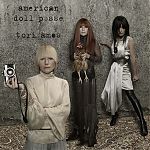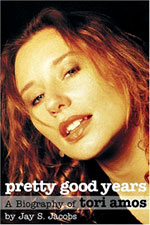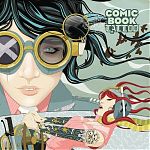- Articles
- Cherries
- Minutiae
- Q&A
- RAINN
- Releases
- Reviews
- Site News
- Them
- Toriphiles
- Touring
- TV/Radio/Web
- Video
News Archives
Keep an eye on our Twitter and Facebook pages since we often post quickie updates there when we're on-the-go.
During tours, we do our best to cover setlists in real-time on Twitter. If you want to tweet a show in, just DM or @ us on the day and tell us to watch your stream that night.
Tori is touring in 2017 to support the release of Native Invader. The European legs runs from early September through early October and the North American leg runs from late October to early December. We do not know if additional dates elsewhere will be added.

Native Invader (album, 2017)

Unrepentant Geraldines (album, 2014)

Gold Dust (album, 2012)

Night of Hunters (album, 2011)

Midwinter Graces (album, 2009)
 Abnormally Attracted To Sin (album, 2009)
Abnormally Attracted To Sin (album, 2009)
Live at Montreux 1991/1992 (DVD, 2008)

American Doll Posse (album, 2007)

A Piano (boxed set, 2006)

Pretty Good Years
(bio, 2006)

Fade To Red
(DVD, 2006)
 Comic Book Tattoo (book, 2008)
Comic Book Tattoo (book, 2008)News: American Way Interview (July 2007)
Okay, if we’re going to take on the patriarchy and its ideology, then what do you do? If it’s too loud, turn it up.
Jill alerted us to this interview which appeared in the Down Low section of the July 1st issue of American Way, American Airlines in-flight magazine.
Bigger Earthquakes
Tori Amos takes on larger themes and a larger sound with her new American Doll Posse.
By Mikael Wood
“I’m obsessed with women’s stories,” says Tori Amos, “how they’ve been able to negotiate what their place is at the roundtable.”
No one who’s heard a single album of Amos’s is likely to disagree with her claim. Since her 1992 breakthrough, Little Earthquakes, the singer-pianist has investigated the social, biological, and political implications of womanhood with an unflinching honesty that’s won her both ardent fans and outspoken critics. On her latest album, American Doll Posse, Amos reacts to the current climate in America with musical portraits of distinct female archetypes. “All of these women are different components of a complete female essence,” Amos says. “And I’m exploring bringing these different components together in one woman. As every woman begins to do that, then you’re dealing with some pretty powerful forces.”
Your last album, 2005’s The Beekeeper, had a mellow, contemplative vibe. This new one rocks a lot harder.
Each record is its own sonic exhibition, and you have to look at them within their context. The Beekeeper was written at a time when I thought things were about to change; that record was about seeing a light at the end of the tunnel, with the dove of peace coming out. When I was writing, I was seeing that people wanted more of a diplomatic approach to problems instead of a confrontational approach.
Things turned out differently than you expected.
Because that didn’t happen, it was time to say, “Okay, if we’re going to take on the patriarchy and its ideology, then what do you do? If it’s too loud, turn it up.” Sometimes that’s the only way that you can hear.
Was that louder, punk-inspired sound your idea for the album right from the start?
I can hear all the arrangements when they’re coming in my head. I always have; that’s how it happens. This is one record where I realized the diversity that the musicians would have to have. Stylistically, everybody would really have to understand how to play this kind of music, even if they weren’t brought up on punk music.
These days you live and record in England, which gives you, as an American, a unique perspective on the United States.
I wrote this in America — I had to. I have a little beach house in Florida, and I’m there more than people realize. But I keep a low profile. I don’t show up anywhere, because I don’t want to be observed. I’m the observer, you see. And how can you be collecting your information and studying your subject if the camera’s turned on you all the time? That would blow your cover.
What were you watching for?
To see how American women were interpreting what is happening to our country, how we’re perceived in the rest of the world. And I was fascinated by what I found. Some didn’t really see how it affected their day hour by hour; some did. But the one thing that I felt I had to do was ask myself why so few are doing so little. That’s what propelled me.



